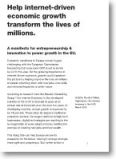 The internet is now a prime driver for economic growth and is continuing to shape how enterprises reach out to partners, funders and their customer/client base. Access to it makes it the conditioning and mediating framework for a discourse about enterprise, from the smallest community business to the very largest corporation.
The internet is now a prime driver for economic growth and is continuing to shape how enterprises reach out to partners, funders and their customer/client base. Access to it makes it the conditioning and mediating framework for a discourse about enterprise, from the smallest community business to the very largest corporation.
A recent 2012 study by the Boston Consulting Group – The Internet Economy in the G-20, the $4.2 Trillion Growth Opportunity declared that…
The (internet) contribution to GDP will rise 5.7% in the EU and 5.3% in the G-20. Growth rates will be more that twice as fast – an average annual rate of 18% – in developing markets, some of which are banking on a digital future with big investment in in broadband infrastructure. Overall, the internet economy of the G-20 will nearly double between 2010 and 2016, when it will employ 32 million more people than it does today…

Download the BCG Report in pdf format here…
Enterprises – social, community or corporate in governance – ignore web connectivity at their peril. Alongside this bow wave of expansion for connected business comes a shift in perception in what it is that the governance, education, data management, capital and talent needs of our communities of interest are, in order to respond to this internet fuelled growth.
An example of this new thinking and radical approach can be found in the recently published Manifesto for Entrepreneurship and Innovation to Power Growth in the EU.

This is a collaborative concept delivered from a number of key internet players in the current EU marketplace. The creators of web based services such as Spotify, Atomico, Seedcamp and Tech City UK amongst others. If the thought of thinking about uber-Geeks and technology puts you off, persist with this article because the thought leaders in their manifesto do have some challenging and innovative ideas that would, if achieved, condition your internet driven social business for decades to come.
Download the Start-Up Manifesto in pdf format here…
Here at SEEM we are always interested in disruptive models of economic creation, good governance, enterprise support and delivery. There are two elements of the manifesto which strike a chime with us and we’ll comment on them below.
Education and Skills:
The manifesto highlights a European Commission study that found across 27 EU countries some 20% of secondary level learners had never or rarely used a computer in their studies. The EU was also critical of teacher training in the IT arena. Our manifesto authors place stress on making teachers digitally confident and with increased competence to rise to the challenge of a digital society.
Teach every child, they state, the principles, processes and the passion for entrepreneurial endeavour from the earliest age. (The web offers a range of free creative, analytical and publishing tools in the Open Source context, that could, for example, transform educative processes around IT if fully adopted).
The final elements of the education manifesto are key to radical economic growth and could, if adopted using the social business framework, transform our sector.
Encourage university students to start a business before they graduate, as well as preparing tertiary level students for a radically different market place. For the social business sector, this chimes well with our debates at SEEM about how to foster the concept of social business creation and support as a life aim in business schools and on IT and commerce based courses.
The authors of the manifesto argue, in a similar vein, that the very largest corporation should open up their training departments to the general public, thereby increasing the critical mass of skills in a community as a necessary condition of creating new, web driven enterprises of every governance hue.
Access to Capital:
Capital is king or queen in starting a new business whatever its philosophical approach to the community marketplace. Revision to tax breaks and increasing the ease with which companies can access finance are mainstays of this part of the manifesto.
Interestingly, the manifesto puts a focus on buying more goods and service from small business. Although not made explicit in the manifesto this is the localism and SME support arguments writ large in EU lettering. It is difficult and complex for small businesses to bid for government contracts in the UK, despite recent moves to make procurement a more open process, but encouraging local purchasing initiatives would be one way to encourage the take up of provision from smaller entities, we think.
The final innovation we recognise in the manifesto is the argument for the creation of a new business form. The E-Corp. This new cross border entity would be creatable on-line and up and running in 24 hours. (A little over optimistic we think…), but the concept holds good. Why should innovative businesses committed to social impact locally not also have the opportunity trade internationally and generate surpluses from outside their local economy to deploy in their own?
This takes the Keynesian notion of ‘leakage ‘ from an economy and reverses its polarity – their leakage can become our social value. Brilliant!
Generated by key thinkers in the EU technology sector, this manifesto none the less offers some innovative and interesting ideas about how to condition change for economic growth across the EU. Changes which are pertinent to start-ups and social innovation across the piece in the UK, whatever profile your business has. See the web site here…
The SEEM Team – thinking about social business start-ups
